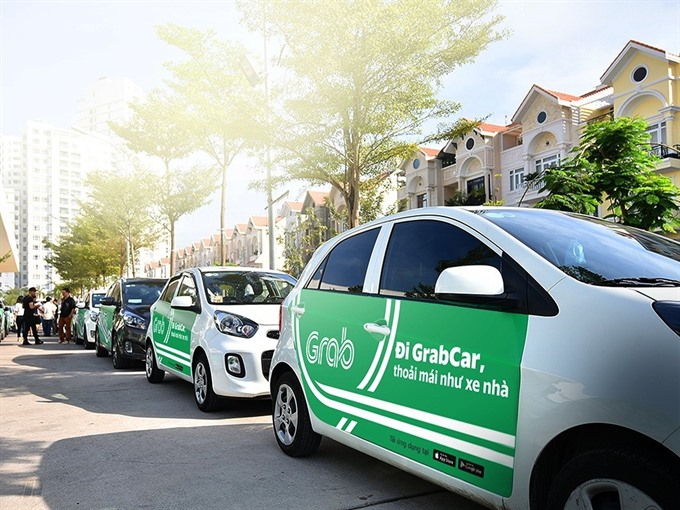HCM City People’s Court commenced trial looking into the suit initiated by the local domestic taxi operator Vinasun against the popular ride hailing service, Grab, on accusations of unfair business practices.

HCM City People’s Court commenced trial looking into the suit initiated by the local domestic taxi operator Vinasun against the popular ride hailing service, Grab, on accusations of unfair business practices.
Vinasun, once a dominant player in taxi transport in the southern region, has seen its market share gradually eaten away by Uber and Grab as they continue to gain popularity, especially as the number of smartphone users in the country rises.
Vinasun claims the ‘illegal operations’ of Grab in Viet Nam are to blame for the company’s falling revenues in 2016 and 2017 – a VND40 billion (US$1.756 million).
Truong Dinh Quy, deputy director-general of Vinasun, based their complaint on the trade law and government’s Decree 37 issued in 2006, which clearly states that the duration of total promotion deals in a year must not exceed 90 days and each promotion programme is not to last beyond 40 days. In addition, businesses that want to hold promotion events must register with the municipal or provincial commerce department.
Hy alleged that in recent times, exploiting the pilot window that the transport ministry granted for software-based transport services, Grab has conducted “rampant” promotion deals and discounts, akin to the practice of “dumping” of manufactured goods.
Vinasun also claimed that the company needs to observe 13 regulations, while Grab only has to follow three, creating unfair competition in the field of passenger transport.
"Industry 4.0 apps are an inevitable trend. However, being just an app-based ride hailing service, Grab has disrupted the taxi transport sector, causing several implications to State management activities in tax collection and ensuring social security for those work for Grab," Quy said.
"In addition, Grab drivers themselves are encountering difficulties when the company collects up to 25-28 per cent from the taxi drivers’ earnings as commissions. Even more concerning, Grab Viet Nam reported charter capital of VND40 billion while they claimed they turned a loss of VND938 billion, which earned them special supervision by the finance ministry," Quy told Vietnam News Agency.
Quy said that the company has prepared for the case over the last year and is ready to fight against Grab and Uber to the end in a “legally transparent” manner.
Grab’s lawyers, on the other hand, contended that Vinasun’s allegations are baseless and that their software solution has actually created fair grounds for competition between conventional taxi operators. They also argued that Vinasun’s evidences and methods of loss calculations are all questionable. On these grounds, Grab asks the court to either suspend the lawsuit or reject Vinasun’s case entirely.
The trial yesterday morning attracted a crowd of taxi drivers from Vinasun and Mai Linh, another well-known taxi company in the country, anxiously awaiting the outcome that could determine the course of their futures.
Former supreme judge Pham Cong Hung said that the outcome of the case depends on who has the weightier evidence in court.
“With that being said, I fully support Vietnamese businesses’ wanting to take matters to court if they see their interests have been violated. This is a totally civilised way of settling business disputes,” Hung told Thanh Nien (Young People) newspaper.
This is the first time the increasing tension between conventional taxi operators and their app-based counterparts took to the fight to the courtroom, all while Vietnamese lawmakers seek to construct appropriate legal tools to effectively regulate these emerging services.
A new draft decree is in the works, which would require Grab and Uber offices in Viet Nam to register for licences as an enterprise doing ‘electronic business’ and transport cars must have easily identifiable logos on both front and back windows. — VNS





